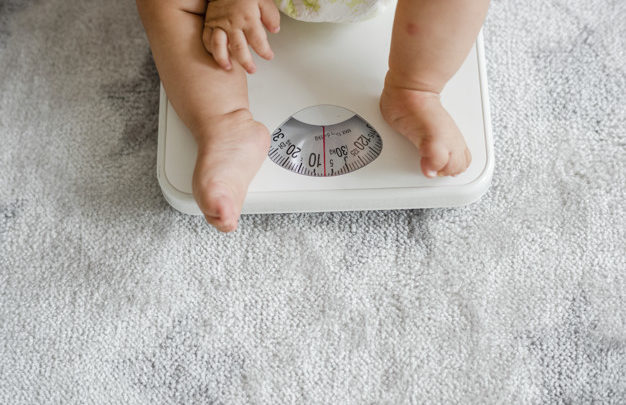Managing Baby Weight Loss When You’ve Been Told to Give Formula
If you've just had a baby chances are you're aware of the normal weight loss newborns experience during the first week of life. Different countries have varying practices but newborns are commonly weighed between Day 3 - Day 5 post birth, and we expect they will lose some weight. Weight loss up to about 8% of their birth weight is considered normal. Some areas say 10%, but if your baby is approaching 9-10% that's definitely a sign that further investigation is required.
Why do our babies lose weight?
To understand this we need to first understand their feeding habits during the first few days of life. A baby's stomach capacity at birth is somewhere in the region of about 5-7ml (this is about a teaspoon!). Babies are accustomed to having nutrition 24/7 in utero, so they must slowly 'wean' themselves off this after birth (so that explains that very frequent feeding in the first few days!). Human colostrum contains all the nutrients our babies need in the first few days of life - including immunoglobulins (to build a health immune system and protect against illness), growth factors (supporting normal growth and development, and also protecting against gastrointestinal conditions), antimicrobials (protecting against infection) as well as protein, carbohydrates and fats. Until the development of antibiotics in the early 20th century, colostrum (both human and bovine) was used to treat a variety of illnesses in adults!
Not only do babies have a small stomach capacity at birth, but colostrum is also low in caloric density and low in fat. It's a nutrient powerhouse of immunoglobulins, growth factors and protein - colostrum is about 3.7% protein, 5.3% carbohydrate and 2.9% fat. This changes slightly as our milk matures (after day 3-4) as the fat content increases. Colostrum only contains about 60 kcals per 100ml - now if we imagine our baby might only be taking 5-10ml of this, we can see how that energy will be used by the body very quickly, resulting in weight loss. Imagine you spend your whole day eating fruit and salads - you're filling your body with wonderful, live nutrition but you'll probably find that you eat lots regularly to keep yourself satiated through the day! It's also important to understand that our babies are supposed to lose some weight, and nature has prepared for this. Babies will almost double their weight between 32 weeks and 40 weeks of pregnancy. Some of this gain is them laying down extra fat stores, in preparation for those first few days feeding on colostrum. So for healthy, term babies, where there aren't any apparent feeding issues, losing 5-7% of their birth weight is very normal. We should then see that they start to regain this lost weight by about 10 -14 days old.
So why has my baby lost more than this?
Well - a healthy baby who is breastfeeding well and taking a sufficient amount of colostrum will be able to get by on this + their fat stores, but if a baby isn't taking enough colostrum (see causes of weight loss explored below) or they're expending too much energy (spending long periods of time ineffectively feeding) you may see by day 5 that they have lost close to 10% or more.
Causes of Newborn Weight Loss
- Not effectively feeding: this could be to do with shallow latch, tongue tie, scheduling feeds/not feeding frequently, topping up with formula meaning baby is full and not demanding feeds as often
- Low milk supply: if mum has underlying health conditions such as IGT (see our blog on this here), has suffered a traumatic birth or postpartum haemorrhage, or is taking certain medications/has medication conditions like poorly managed diabetes or hypothyroidism, or if baby simply hasn't been feeding often enough then mum may not be producing as much colostrum as her baby needs
- Intravenous fluids in labour: mums who are in labour for a prolonged period, particularly after induction, may receive many litres of IV fluids through their labour. This might over increase baby's birth weight (baby may be retaining some of this fluid) and this could contribute to what seems to be a very large weight loss in the first few days after birth. This is why a full feeding assessment is absolutely necessary in cases of excessive weight loss
I've been told I have to top up - now what?
As a midwife and lactation consultant I come across this situation time and time again - baby has been weighed on day 3-5, and has lost 8-10% of birth weight. The parents are told 'You need to supplement with formula’. Here's a little caveat - supplementing the baby (particularly with formula) might fix the number on the scales, but it doesn't fix the root cause of the problem. If your baby has lost too much weight this is a warning sign that something with breastfeeding is not quite right, and in order to support long term breastfeeding we need to get to the bottom of this as soon as possible!

If you've been advised to top up, it's worth getting in touch with an IBCLC for support.
The next step is to figure out why your baby may have lost too much weight...
- Is breastfeeding consistently painful/are your nipples damaged? This may indicate either a shallow latch, which will limit how much milk your baby can obtain from the breast compared to when they're latched deeply, or possibly that your baby has a tongue restriction/tongue tie
- Does baby feed for long periods (more than 60 minutes each feed)? Timing isn't everything with breastfeeding, and what's more important is how effectively your baby is feeding (see the next paragraph) but if a baby is consistently feeding for more than 60 minutes, this tells us either baby is feeding effectively, or the milk is flowing too slowly. If your baby is taking this long or only taking one breast per feed, start offering both breasts at each feed, switching sides when your baby slows, falls asleep or stops following a suck/swallow pattern. This is vital for establishing a good milk supply and allow your baby to take all the milk they need
- Does your baby fall asleep quickly at the breast? Do you hear your baby swallowing? Are they effectively sucking? If you find yourself spending most of the feed tickling your baby's toes, blowing on them or otherwise trying to wake them up - chances are your baby isn't feeding very effectively
Signs of effective feeding include:
- Being able to hear your baby swallowing (particularly at the beginning of a feed)
- Seeing a change in their sucking patterns (from a quick suck-suck-suck pattern right at the beginning to a suck-pause-swallow pattern through the majority of the feed)
- Notice how baby is bringing his jaw up and lips together, then dropping his chin and pausing? This shows us milk is flowing into baby's mouth and they're feeding effectively.
Is your baby having regular wet/dirty nappies?
In the first week after birth you should expect to see at least one wet nappy for every day of age, and 1-2 poos per day. So a 2 day old baby should have 2 wet nappies, and at least 1-2 poos, a 5 day old baby should have 5 wet nappies and at least 1-2 poos. From the end of the first week we would expect baby to have 6-8 heavy wet nappies per day and at least 1-2 poos. If your baby isn't meeting these milestones, this gives us an indication they're not getting enough.
Do you notice changes in your breasts before and after feeds?
Did you feel a dramatic fullness in your breasts around day 3/4? If you are noticing the above, that's a great sign that your body is establishing a good milk supply, and therefore the issue with your baby's weight loss might lie with them being able to access the milk, rather than how much your body is producing. If your breasts don't ever feel really full, one feels significantly fuller than the other, or if you're no t noticing changes before and after feeds the issue may lie with your milk supply.
t noticing changes before and after feeds the issue may lie with your milk supply.
So how much weight should my baby gain?
This image below shows average weight gain for breastfed babies based on the World Health Organisation standards. Keep in mind this average, and every baby will vary slightly. 
If you've been advised to top up, consider seeking some breastfeeding support to determine the root cause. It's easy to get caught in the top up trap and have an impact on your milk supply and potentially make the problem more difficult to resolve. If your baby isn't gaining weight - this is a lightbulb moment to tell us we need to correct the underlying issue as well as ensuring baby is getting adequate nutrition (which might mean supplementation) but we should always address both of these.
If you’re struggling with weight gain, or receiving conflicting advice please get in touch with a breastfeeding specialist (like an IBCLC) who can accurately assess your baby’s feeding and help you make a plan to support your breastfeeding journey.
References Ballard, O., & Morrow, A. L. (2013). Human milk composition: nutrients and bioactive factors.Pediatric clinics of North America,60(1), 49–74. https://doi.org/10.1016/j.pcl.2012.10.002
Godhia, M. L., & Patel, N. (2013). Colostrum–its Composition, Benefits as a Nutraceutical–A Review.Current Research in Nutrition and Food Science Journal,1(1), 37-47.
newborn, breastfeeding, newborn weight loss, top up, formula, expressed milk, expressing, tongue tie, painful breastfeeding, nipple pain, low milk supply
Sign up today for unlimited access:
- Book appointments
- Expert advice & tips
- Premium videos & audio
- Curated parenting newsletters
- Chat with your bloss community
- Discounts & competitions
- Special events





Leave a Rating / Review
You must be logged in to post a comment.